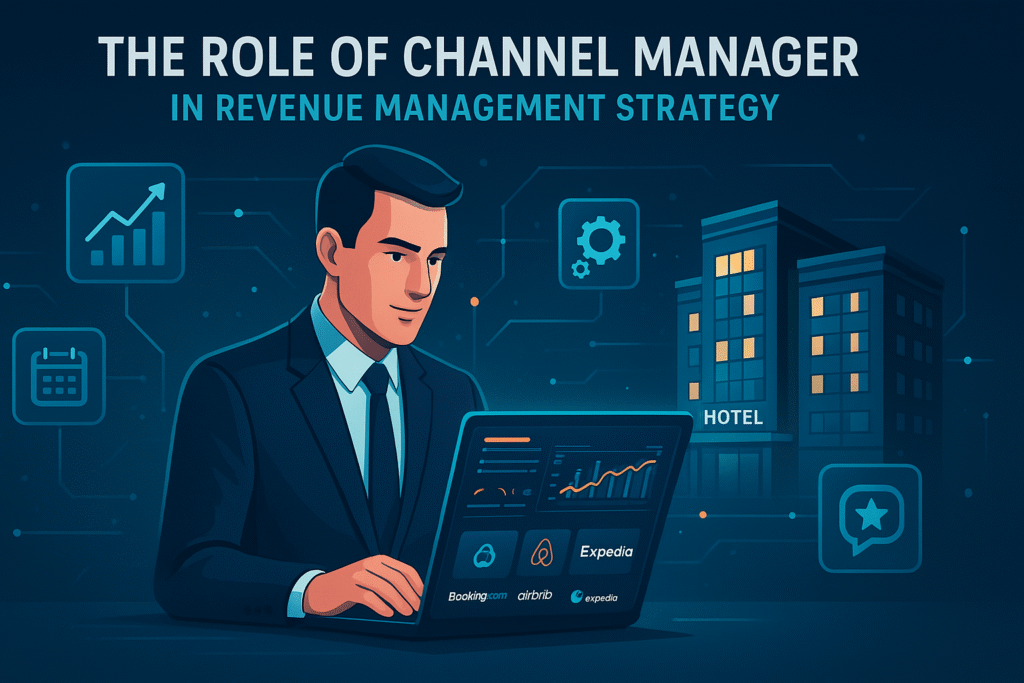In today’s dynamic hospitality industry, effective revenue management is essential for hotels aiming to maximize profitability and occupancy. With the increasing complexity of managing multiple distribution channels such as OTAs (Online Travel Agencies), direct booking platforms, and global distribution systems (GDS), hoteliers need advanced tools to keep up.
One of the most critical components in this landscape is the Channel Manager. This powerful software solution serves as the backbone of a hotel’s distribution strategy and plays a pivotal role in the overall revenue management strategy.
This article explores the importance of channel managers, how they integrate with revenue management, and why investing in a robust channel management system is a game-changer for hoteliers seeking to optimize their revenue streams.

What is a Channel Manager?
A Channel Manager is a software platform that allows hotels to manage room inventory, rates, and availability across multiple online sales channels simultaneously. These channels can include:
- OTAs like Booking.com, Expedia, Agoda
- Direct booking engines on hotel websites
- GDS platforms for travel agents
- Metasearch engines like Google Hotel Ads
The channel manager ensures that when a booking is made on one channel, the availability and rates are updated instantly across all other connected channels. This synchronization eliminates the risk of overbooking and reduces manual workload.
Why Channel Management is Vital for Revenue Management
1. Maximizes Inventory Utilization
Revenue management aims to sell the right room to the right customer at the right price and time. A channel manager provides a centralized platform to monitor and control room availability across all distribution channels, ensuring maximum occupancy without overbooking.
2. Dynamic Rate Adjustments
Revenue managers adjust pricing based on market demand, competitor rates, seasonality, and booking trends. With a channel manager, rate changes made in the system are automatically reflected on all channels, maintaining rate parity and avoiding guest confusion or price wars.
3. Reduces Human Error
Manual updates to multiple channels are time-consuming and prone to mistakes. Double bookings, incorrect rates, or mismatched availability lead to lost revenue and unhappy guests. A channel manager automates these updates, improving accuracy and operational efficiency.
How Channel Manager Supports Pricing Strategies
Pricing is the cornerstone of any revenue management strategy. The channel manager helps in:
- Implementing dynamic pricing: Update prices in real-time across all platforms to reflect demand fluctuations.
- Rate parity enforcement: Ensure your rates are consistent on every channel, protecting your brand value.
- Promotion management: Deploy limited-time offers or special packages effectively on selected channels.
By integrating with revenue management systems (RMS), channel managers enable hoteliers to execute pricing strategies swiftly and confidently.
Integration with Other Revenue Management Tools
Modern channel managers are designed to work seamlessly with other critical hotel systems such as:
- Property Management Systems (PMS): For real-time data on bookings and cancellations.
- Revenue Management Systems (RMS): For advanced pricing analytics and forecasting.
- Booking Engines: To optimize direct booking channels.
- Customer Relationship Management (CRM): To personalize offers and improve guest retention.
This ecosystem allows data to flow freely between systems, providing revenue managers with comprehensive insights and control.
Benefits of Using a Channel Manager in Revenue Strategy
1. Increased Efficiency
Automation of rate and inventory updates frees up your team to focus on strategic tasks rather than manual data entry.
2. Improved Distribution Reach
Manage and expand your presence across multiple channels from a single interface, reaching more potential guests.
3. Better Revenue Forecasting
Access to real-time booking data allows revenue managers to forecast demand more accurately and adjust strategies proactively.
4. Enhanced Guest Experience
By avoiding overbookings and rate inconsistencies, guests receive reliable information, fostering trust and loyalty.
Common Challenges in Channel Management and How to Overcome Them
1. Overbooking
Despite automation, technical glitches or misconfigured settings can lead to overbooking. Regular audits and choosing a reliable channel manager with 24/7 support help mitigate this risk.
2. Rate Parity Violations
Ensuring consistent pricing across OTAs and direct channels can be challenging. Strict monitoring and use of automated parity tools embedded in channel managers are essential.
3. Integration Issues
Seamless integration with PMS and RMS is crucial. Before selecting a channel manager, confirm compatibility and request demonstration of integration features.
Future Trends in Channel Management and Revenue Management
- AI and Machine Learning: Predictive analytics will drive even smarter pricing and inventory allocation decisions.
- Voice Search and Mobile Bookings: Channel managers will optimize listings for voice assistants and mobile platforms.
- Increased Use of Metasearch: Direct integration with metasearch engines will enhance visibility and bookings.
- Personalization: Integration with CRM will enable personalized offers distributed via channel managers.
Conclusion
The channel manager is no longer just a convenience tool but a strategic asset in your revenue management arsenal. Its role in synchronizing rates, managing inventory, and integrating with other hotel systems directly impacts your hotel’s profitability and operational efficiency.
For hoteliers aiming to thrive in an increasingly competitive environment, investing in a reliable and advanced channel manager is critical. By leveraging the power of channel management within your revenue strategy, you can maximize occupancy, optimize pricing, and ultimately boost your bottom line.


